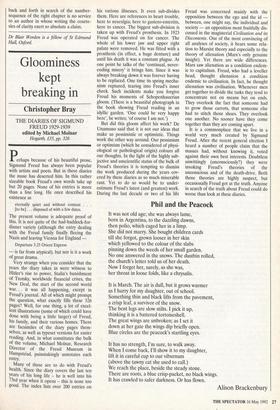Gloominess kept breaking in
Christopher Bray
THE DIARIES OF SIGMUND FREUD 1929-1939 edited by Michael Molnar Hogarth, £35, pp. 326 Perhaps because of his beautiful prose, Sigmund Freud has always been popular with artists and poets. But in these diaries the muse has deserted him. In this rather sizeable book Freud's own words take up but 20 pages. None of his entries is more than a line long. He once described his existence as
eternally quiet and without content . . . [to be] ... disposed of with a few dates.
The present volume is adequate proof of this. It is not quite of the had-haddock-for- dinner variety (although the entry dealing with the Freud family finally fleeing the Nazis and leaving Vienna for England —
Departure 3.25 Orient Express
— is far from atypical), but nor is it a work of great drama.
Very strange when you consider that the years the diary takes in were witness to Hitler's rise to power, Stalin's banishment of Trotsky, worldwide financial crises, the New Deal, the start of the second world war. . . it was all happening, except in Freud's journal. All of which might prompt the question, what exactly fills these 326 pages? Well, for one thing, a lot of excel- lent illustrations (some of which could have done with being a little larger) of Freud, his family, and their various homes. There are facsimiles of the diary pages them- selves, as well as typeset versions for easier reading. And, in what constitutes the bulk of the volume, Michael Molnar, Research Director of the Freud Museum in Hampstead, painstakingly annotates each entry.
Many of these are to do with Freud's health. Since the diary covers the last ten years of his long life – he is well into his 73rd year when it opens – this is none too good. The index lists over 200 entries on his various illnesses. It even sub-divides them. Here are references to heart trouble, here to neuralgia; here to gastero-enteritis, here to cancer. The biggest sub-division is taken up with Freud's prosthesis. In 1923 Freud was operated on for cancer. The whole of his lower jaw and upper right palate were removed. He was fitted with a prosthesis (in effect, a huge denture) and until his death it was a constant plague. At one point he talks of the 'continual, never- ending misery' it brings him. Since it was always breaking down it was forever having to be replaced. One time its spring mecha- nism ruptured, tearing into Freud's inner cheek. Such incidents make you forgive Freud his moments of Schopenhauerian gloom. (There is a beautiful photograph in the book showing Freud reading in an idyllic garden. 'One could be very happy here', he writes; 'of course I am not.') But did this gloom affect his work? De Unamuno said that it is not our ideas that make us pessimistic or optimistic. Things work the other way around. Our pessimism or optimism (which he considered of physi- ological or pathological origin) colours all our thoughts. In the light of the highly sub- jective and unscientific status of the bulk of Freud's theories it is tempting to dismiss the work produced during the years cov- ered by these diaries as so much miserable rant. Yet to do so would be to under- estimate Freud's latest (and greatest) work. During the last decade or two of his life Freud was concerned mainly with the opposition between the ego and the id — between, one might say, the individual and society — an opposition most fruitfully dis- cussed in the magisterial Civilisation and its Discontents. One of the most convincing of all analyses of society, it bears some rela- tion to Marxist theory and especially to the theory of alienation (Marx's only genuine insight). Yet there are wide differences. Marx saw alienation as a condition endem- ic to capitalism. Freud, who had a leveller head, thought alienation a condition endemic to civilisation. In fact, he thought alienation was civilisation. Whenever men get together to divide the tasks they tend to concentrate not on means but on ends. They overlook the fact that someone had to grow those carrots, that someone else had to stitch those shoes. They overlook one another. No sooner have they come together than they are coming apart.
It is a commonplace that we live in a world very much created by Sigmund Freud. After the recent general election I heard a number of people claim that the masses had, without knowing it, voted against their own best interests. Doubtless unwittingly (unconsciously?) they were invoking Freud's theories of the unconscious and of the death-drive. Both those theories are highly suspect, but occasionally Freud got at the truth. Anyone in search of the truth about Freud could do worse than look at these diaries.


















































 Previous page
Previous page